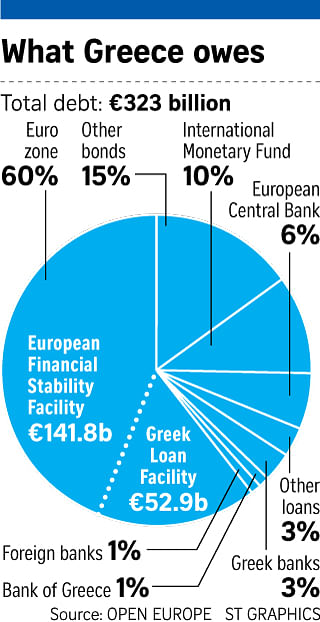The referendum over the bailout agreement with international creditors will likely go ahead as planned on Sunday despite talk that a deal may be struck.
"Come Monday, the Greek government will be at the negotiating table after the referendum, with better terms for the Greek people," Greek Prime Minister Alexis Tsipras said in a Twitter message posted as he spoke on national television yesterday. "A popular verdict is much stronger than the will of a government," Bloomberg reported him as saying.
Euro zone finance ministers were set to have a discussion last night on the proposals put forward by Mr Tsipras.
Reports yesterday said that he had offered creditors a conditional letter of acceptance of the bailout terms with accompanying speculation of a postponement of the referendum, which has come in for criticism from all sides.
Greece defaulted yesterday on a €1.6 billion (S$2.4 billion) payment to the International Monetary Fund.

The Council of Europe said the referendum was organised too hastily and was not up to European standards. "It is obvious that the timeline is too short with regards to our standards," said Mr Daniel Holtgen, spokesman for the council secretary-general Thorbjoern Jagland, according to Reuters.
Italian Prime Minister Matteo Renzi said the referendum is not about fiscal issues, since differences between Greece and creditors were over "small things" such as taxes. Rather, the vote was called for political reasons and Mr Tsipras' decision to call it is "highly risky", Mr Renzi said, speaking at a dinner in Berlin.
Even if it does go ahead, it is unlikely to offer investors much certainty. Both sides have painted the vote as a decision on outcomes.
A "Yes" vote means agreeing to austerity reforms and a new bailout. Voting "No" would mean Greeks want to exit the euro zone.
But a closer look shows it is not that straightforward.
A translation by the BBC shows that the question is rather more complex: "Should the proposed agreement be accepted, which was submitted by the European Commission, the European Central Bank, and the International Monetary Fund in the Eurogroup of June 25, 2015 and consists of two parts, which constitute their unified proposal?"
The ballot paper comes with two documents attached: "Reforms for the Completion of the Current Programme and Beyond" and "Preliminary Debt Sustainability Analysis".
There are two boxes: Not approved/No, and Approved/Yes.

